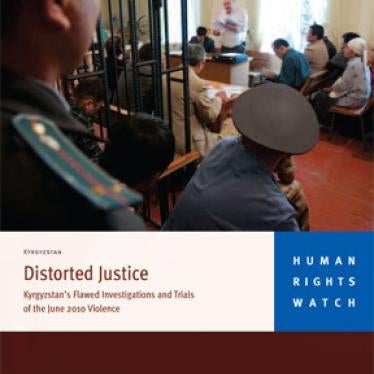(New York) – An ethnic Uzbek detained and allegedly tortured by police in southern Kyrgyzstan died on August 9, 2011, two days after he was released from police custody, Human Rights Watch said today. The police had threatened to press charges against him in connection with the June 2010 interethnic violence, he told his wife before he died.
Kyrgyzstan authorities should ensure a prompt, effective, and thorough investigation into the torture allegations and provide compensation to his family, Human Rights Watch said. The police tried to extort US$6,000 from him in exchange for releasing him, his wife told Human Rights Watch.
“Kholmirzaev’s torture in police custody and his subsequent death are harrowing examples of the extent of corruption and impunity in Kyrgyzstan’s law enforcement,” said Hugh Williamson, Europe and Central Asia director at Human Rights Watch. “Do we need another person to die for Kyrgyz authorities to stop police from engaging in torture, extortion, and other deplorable practices.”
Three police operatives in civilian clothing took the man, Usmonzhon Kholmirzaev, a Russian citizen, from his home in Bazar Korgon to the local district police department at about 4 p.m. on August 7. They did not show an arrest warrant, nor did they say where they were taking him, his wife, Zulfiya, told Human Rights Watch.
The policemen allegedly tortured Kholmirzaev for several hours, trying to extort money from him in exchange for his release. He told his wife that as soon as he was taken into the station, the police put a gas mask on him and started punching him. When he fell down, one of the operatives, using his knees, jumped on Kholmirzaev’s chest two or three times. Kholmirzaev said he lost consciousness.
When he regained consciousness, he told his wife, the police threatened that if he did not pay, they would frame him on charges of involvement in an attack during the June 2010 violence. They finally agreed to accept $680, which his family brought, and he was released at about 8 p.m., his wife said. Police told him they would harm his family if he told anyone what had happened.
When he returned home, he could barely walk, his wife said, and his condition worsened the next day. He was taken to the local hospital, where he died early on the morning of August 9. He was hesitant to tell doctors about his injuries but before he died, told his wife, “They beat me to death.”
Kholmirzaev’s is one of seven cases Human Rights Watch has documented recently in which police in southern Kyrgyzstan beat ethnic Uzbek detainees, tried to extort $2,000 or more, and threatened to press criminal charges, including charges related to the June 2010 violence, if victims failed to pay. Human Rights Watch documented four such cases in one week in July on just one street in Osh.
Kholmirzaev told his wife that the police had threatened that if he did not pay what they demanded, they would frame him for involvement in the attack at the Sanpa factory in June 2010, for which several people have already been convicted.
After his death, Kholmirzaev’s wife appealed to the Russian consulate in Osh for help. A consulate representative and staff from international organizations were present at Khalmurzaev’s autopsy. Official results will be ready in a month, but Kholmirzaev’s wife and her lawyer, also present at the autopsy, told Human Rights Watch that the forensic expert issued preliminary oral conclusions after he examined the body. The expert said that Khalmurzaev’s sternum was fractured, a piece of the bone had caused a rupture, and he died of internal hemorrhaging, his wife and the lawyer said.
On the same day, the Russian consulate sent a letter to the prosecutor of Jalal-Abad Province, where Kholmirzaev lived, asking the prosecutor to open an investigation. The lawyer said that the prosecutor’s office promptly opened a criminal case under Articles 104 (4) (deliberate grave damage to a person’s health causing death), 305 (abuse of power), and 305-1 (torture).
Human Rights Watch is concerned for the safety of Kholmirzaev’s family, who remain vulnerable to potential intimidation and retribution. The family’s lawyer said that the three Bazar Korgon policemen who allegedly detained and tortured Kholmirzaev had been neither questioned nor formally suspended from their work as of August 11.
“It is encouraging that the local authorities opened an investigation, but not enough,” Williamson said. “Kholmirzaev’s torture and death show the chilling consequences that can result from total impunity for law enforcement officials who use torture for investigation or personal enrichment.”
Kyrgyzstan is a party to numerous international human rights treaties that ban the use of torture, in particular the UN Convention against Torture and Other Cruel, Inhuman or Degrading Treatment or Punishment, to which Kyrgyzstan acceded in 1997. Torture is criminalized in Kyrgyzstan’s Criminal Code (Article 305-1) and in Article 22 of the country’s Constitution.
Torture is a widespread problem in Kyrgyzstan, but Kholmirzaev’s death exposed the particular vulnerability of ethnic Uzbeks to arbitrary detention, torture and police extortion in the wake of the June 2010 interethnic violence, Human Rights Watch said.
“Kholmirzaev’s death should become the final push for Kyrgyz authorities to start ensuring the rule of law and fight rampant impunity for human rights violations in the south,” Williamson said.







